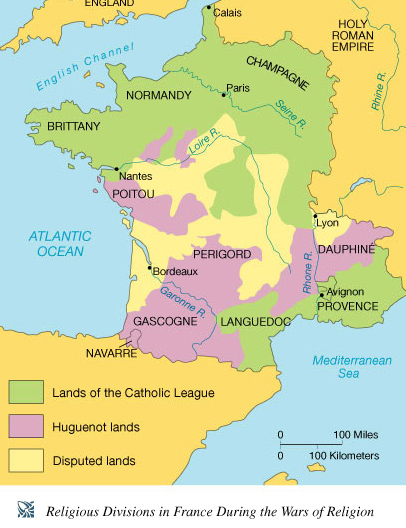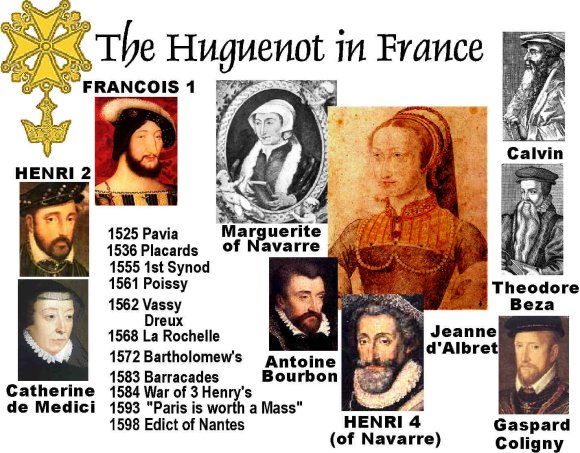Luther had given the impetus to the Reformation in France first by means of his writings which were pouring in from Frankfort, Strassburg, and Basel. The Greek New Testament of Erasmus and Lefevre's translation into French were condemned as blasphemies against Jerome and the Holy Ghost. But the reformation movement could not be stopped. The reading of the Bible and the books of Luther soon became a practice among the middle and higher classes. Under the inspiration of Margaret, the king's sister, small, private groups were organized at the royal court to read the Bible in secret. The "Lutheran contagion" continued to spread. No exact figures are available, but in 1534 it was estimated that there were thirty thousand followers of Luther in Paris alone.
So far it was chiefly Luther who inspired the reformation movement in France. But Zwingli and other German and Swiss Reformers also exercised some influence. Protestantism in France was still weak. As yet it was not more than a protest against the the Roman Church. The followers of Luther lacked all organization, and there was no unified leadership.
For a while it seemed as if Farel might supply the much-needed leadership. He was learned, eloquent, and full of fiery zeal. He persuaded Olivetan, a relative of Calvin and an excellent Greek scholar, to make a French translation of the New Testament. This translation was a great help. Nevertheless the reformation movement in France remained confused. Suddenly the year 1536 saw the beginning of a great change.
In that year Calvin published his Institutes and began his work in Geneva. With the publication of the Institutes the reformation in France received in Calvin its leader and organizer. Because he was himself French, Calvin was better able to communicate with the French. He also provided a definite organization, a clear statement of doctrine, a form of public worship and a system of church government.
By 1559 there were many Protestant churches in France, and it has been estimated by this time about one-sixth of the population of France had become Protestant. In May, 1559 the Protestant churches of France held a synod in Paris and adopted a creed known as the Gallic Confession. It was also about this time that the Protestants in France came to be called Huguenots. By 1562 they had formed a strong party. They became a prosperous, intelligent class and many belonged to the nobility, but they were in a minority.
Both Catholics and Protestants tried to control the government. Young Charles IX and his regent mother, Catherine de Medici, favored first one side and then the other. Civil war broke out between the two religious parties in 1562, the beginning of the Wars of Religion. The Huguenots defended themselves with varying success.
In 1570 a brief peace was made. The Huguenots were given certain towns in which they were free to defend themselves. Henry of Bourbon, a Protestant, was to marry Margaret, the sister of Charles. Thus it was possible that this Henry might become ruler of France. The Catholic extremists alarmed Catherine with reports that the Huguenots were plotting to take the throne. Catherine convinced the innocent king of this, and a plot was formed for a treacherous and wholesale massacre. All of the leading Huguenots were invited to Paris for the marriage of Henry and Margaret. In the early morning of August 24, 1572, Saint Bartholomew's Day, bells were rung in the city of Paris as a signal for the massacre to begin. For three days and nights the massacre went on. No fewer than two thousand Protestants were murdered in Paris, and, as the massacre extended to other cities, over ten thousand throughout the country. One of the first victims was the noble leader of the Huguenots, Gaspard de Coligny. Henry of Bourbon, however, escaped. It was one of the foulest crimes recorded in history.
Rather than ending the civil war, the massacre of St. Bartholomew gave it new impetus. The conflict continued into the reign of Henry III who succeeded his brother Charles. It was a three-cornered conflict between three Henry's: Henry of Guise, the Catholic leader; King Henry III, who tried to follow a moderate course; and Henry of Bourbon and Navarre, the Protestant leader.
Henry of Guise was murdered on orders of Henry III, who in turn was assassinated in revenge. Thus in 1589 Henry of Bourbon had a clear title to the throne. Because most of the people were Catholic and would not tolerate a Protestant king, Henry declared himself a Catholic in 1593 and in 1594 entered Paris in triumph as King Henry IV.
Though no longer a Protestant, Henry did not forget his former comrades. In 1598 he issued the Edict of Nantes, which granted the Huguenots freedom of private worship, civil rights, and the right to public worship in two hundred towns and three thousand castles. Henry IV was assassinated in 1610 and the kingdom was again torn by warring factions. Many of the finest citizens of France fled to other countries and to the New World.
The fall (1628) of La Rochelle to Cardinal Richelieu's army and the Peace of Alais (1629) marked the end of Huguenot political privileges. After 1665, Louis XIV was persuaded by his Roman Catholic advisers to embark on a policy of persecuting the Protestants. By a series of edicts that narrowly interpreted the Edict of Nantes, he reduced it to a scrap of paper. Finally, in 1685, he declared that the majority of Protestants had been converted to Catholicism and that the edict of 1598, having thus become superfluous, was revoked. No French Protestants were allowed to leave the country; those who openly remained Protestants were promised the right of private worship and freedom from molestation, but the promise was not kept. Thousands fled abroad and several provinces were virtually depopulated. The revocation of the Edict of Nantes weakened the French economy by driving out a highly skilled and industrious segment of the nation, and its ruthless application increased the detestation in which England and the Protestant German states held the French king. Its object—to make France a Catholic state—was fulfilled on paper only, for many secretly remained faithful to Protestantism, while the prestige of the Roman Catholic Church suffered as a result of Louis's intolerance.


